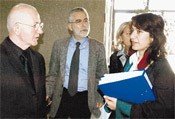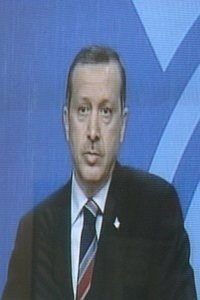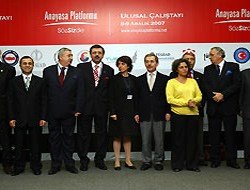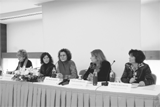AKP "Putting Veneer on the 12 September Citizenship"
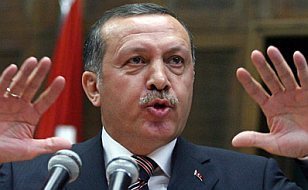
In its constitutional draft, the Justice and Development Party (AKP) has offered the definition of citizenship from the 1924 Constitution, right after the foundation of the Turkish Republic.
Prof. Dr. Baskin Oran argues that this definition, which speaks of the "nation's inseparable integrity" creates "not voluntary but compulsory citizenship".
He adds, "The fact that the AKP retains the sentence, 'The official state language is Turkish', uses the term 'Turkish' in its definition of citizenship and also retains the expression "the inseparable integrity of state and nation" shows that it is putting a veneer on the 12 September [1980, the military coup] constitution and re-presenting it to us."
Academics accused of "inciting hatred and hostility"
The discussion of the constitutional draft coincides with the controversial overruling of the acquittal of Prof. Dr. Baskin Oran and Prof. Dr. Ibrahim Kaboglu. The 8th Penal Chamber of the Supreme Court of Appeals last week decreed that the academics should be punished for the Minority Rights and Cultural Rights report they wrote when members of the Prime Ministerial Human Rights Advisory Committee in 2004.
They stand accused of "opening the nation's integrity for discussion" and "threatening the unitary state and the nation's inseparability". Indeed, the term "clear and present danger" was used...
At the same time, an investigation into Ismail Türüt's racist song has been started by the prosecution. However, he is not accused of "inciting hatred and hostility", like Oran and Kaboglu were, but of "praising crime and criminals".
AKP retains controversial articles
At a weekend camp, at which the AKP discussed the new constitutional draft, three articles which concern citizenship and minority rights were accepted:
Definition of citizenship: The statement of the 1924 Constitution has been retained: "Everyone bound to the Turkish state through the bond of citizenship is a Turk".
Article 3: This article is in the current constitution (from 1982) and has been used to justify the closure of several parties: "The Turkish state, with its territory and nation, is an indivisible entity.
Turkish as state language: The committee of experts, under the leadership of Prof. Dr. Ergun Özbudun, had suggested that the relevant sentence in Article 3 should read "The state's official language is Turkish". However, at the weekend meeting, the AKP delegation decided to retain the formulation of the present constitution: "The state language is Turkish."
Oran: Not "Turkish", but "of Turkey"
Prof. Dr. Oran outlined how these three articles create "compulsory citizenship":
Definition of citizenship: "The term 'Turkish' denotes a race, even worse, it denotes a race and a religion. They do not call non- Muslim Turkish Republic citzens 'Turk'; when they say, for instance, 'A Jewish girl married a Turk', what they mean is, 'She married a Muslim'. The term 'Turkish' in the definition of citizenship is separatist because it leaves out Kurds and non-Muslims. You can claim 'without religious or racial discrimation' as long as you want. It does not make a difference."
"This is not a constitution which extols the individual. When an individual's sub-identity is not accepted, the individual does not count. It tells those who say 'I am Kurdish, I am Armenian', 'You are of the Turkish nation'. But if they said 'a Turkey Armenian, a Turkey Kurd', this would be step towards voluntary citizenship."
"In the beginning (of the Republican period), Mustafa Kemal preferred the term 'Turkey' to 'Turkish'. He talked about the 'Turkey army' and the 'Turkey woman'. In a handwritten constitutional draft of 1923, he even uses the term 'of Turkey' (in Turkish 'Türkiyeli') for citizens. It is in 1924 that the expression 'is Turkish' arrives. Around a year after that, 16 months after the declaration of the Republic, the Kurdish uprising begins."
The nation's inseparable integrity: "The state may have inseparable integrity, but this is not applicable to the nation. Because you said 'Turkish' before, this means that you oppress all non-Turks. If you had said 'the Turkey nation', this would not be the case."
"This constitutional article has begun to be used instead of the old Articles 141 and 142. In the past, they were used for anyone seeking socio-economic rights. They were labelled 'communist' and punished. Now this constitutional article is used against anyone seeking freedom of expression and human rights."
(Official) state language: "A state does not have a language, only an official language. The reason for the 1982 Constitution saying 'the state language is Turkish' is that the real statement was 'In Turkey, no language but Turkish is spoken or written'."
Oran: AKP needs to become modern first
Oran claims that the AKP, which received 47 percent of the votes in the 22 July general elections, is not able to make these changes:
"The AKP has not become urbanised. It is still rural. One leg is in the village, one leg in Europe, it is stuck between the two. It is trying to step from Malatya (in the East) to Brussels without passing through Istanbul."
"Society is being frightened by the 'fear sprayers' to such an extent that we have people like Ismail Türüt. Society recreates them. First the AKP must become civilised and modern." (TK/AG)
KURDISH QUESTION
PKK Ceasefire to be Terminated on 31 October?

KCK CASE
Court Dismissed Request for Defence in Kurdish

7th Istanbul Gathering for Freedom of Thought

CONSTITUTIONAL AMENDMENTS
58 Percent Said "Yes" to Constitutional Reform Package

Rights Organizations 3 Years ahead of Foreign Minister






